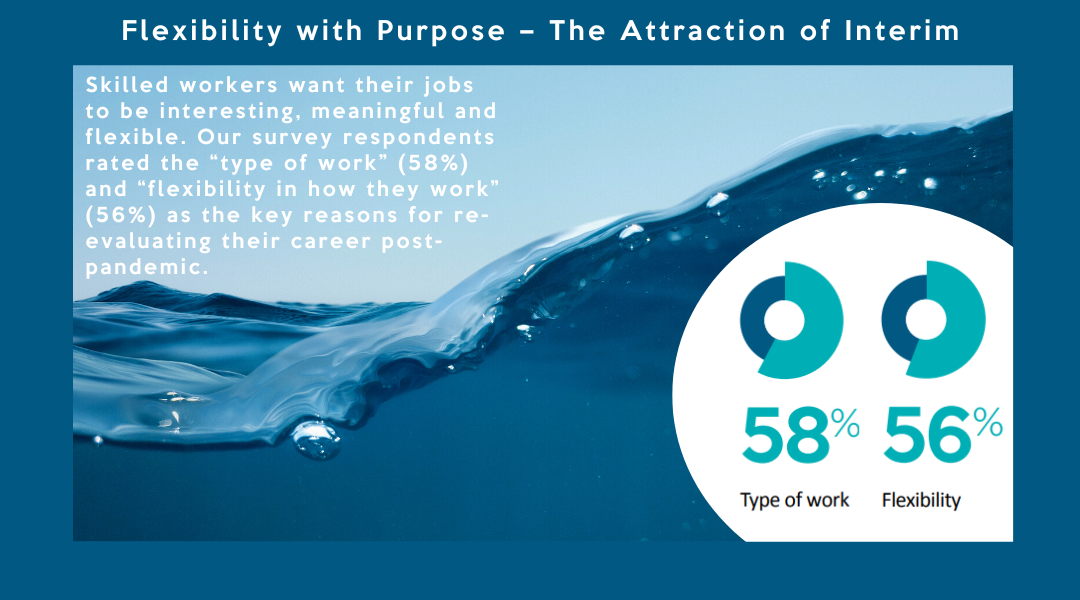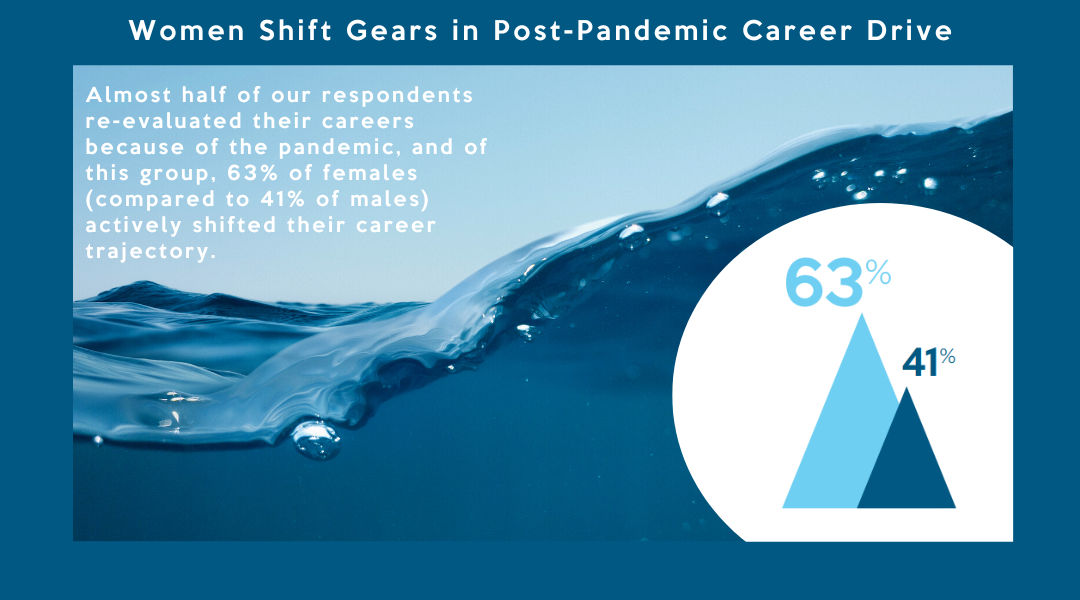Businesses are struggling to fill job vacancies as many workers who were in the latter stages of their careers left the workforce during Covid-19 and won’t be coming back. Other workers are rethinking where and how they work, and skilled migration levels are still very low.
At many levels there are no quick fixes – except perhaps at the executive level.
As our research shows, there is a strong cohort of highly experienced executives who can help power organisations forward. They’re looking for purposeful and flexible work – and they’re ready to lead.
Please click here to download Watermark's 2022 Annual Interim Executive Survey.
Australian businesses are feeling the effect of a great reset in the labour force triggered by the pandemic. After adopting new working practices, workers at all levels want more choice in where and how they work.
This isn’t a surprising trend, especially not at the executive level. Every year Watermark Search has conducted its Annual Interim Executive Survey we’ve heard from more and more people who want to work differently.
And in 2022, many more people want more flexible work:
Nearly 80% of workers nominated hybrid working and working from home as highly desired
1 Nearly two thirds of workers agreed with the statement: “The pandemic has made me rethink the place that work should have in my life”
2 Just over half of workers agreed the pandemic made them question the purpose of their day-to-day job
3 38% of workers reported in 2021 that they looking at leaving their current employer in the next 12 months
4
This movement isn’t going to slow down noted Chris Howard, Gartner’s Chief of Research, commenting on the findings of Gartner’s 2021 Hybrid and Return to Work Survey:
“What is happening now is happening to people, to humanity. Gartner research confirms that the intent to leave or stay in a job is only one of the things that people are questioning now as part of the larger human story we are living. You could call it the ‘Great Reflection’.”
For many organisations it is unsettling to see so many leaders leave for more flexible work opportunities. They might try to manage the knock-on effect through the traditional permanent search process, but this approach is proving slow and difficult in the current job market.

Skilled workers are questioning what is important to them, though we know many of them are interested in interim assignments and we see excellent opportunities to tap into probably the most under-utilised talent pool in history.
As our research shows, organisations can benefit from the Great Resignation or Great Reflection – if they are willing to change their thinking.
Who is winning the War for Talent?
We are seeing the balance of power shift from the organisation to the individual.
Increasingly individuals are saying,
“I have the right skills for the role, and this is how I would prefer to work.”
Now we have a labour market where demand for talent is high, highly experienced workers are well-positioned to demand work suits them, not the other way around.
This major power shift was hinted at several years ago, including in November 2018 research by The Josh Bersin Group, which found the nature of the work itself was the most important factor (26%) for inspiring workers, making them happier, and making them want to work harder, followed by the opportunity to learn and grow (19%). The type of work people are engaged in rated twice as important as culture and four times more important than money.
The nature of work is even more important in 2022 as Chris Howard, Gartner Chief of Research, explained in a January 2022 interview:
“People want purpose in their lives – and that includes work … monetary compensation is important for surviving, but deeper relationships, a strong sense of community and purpose-driven work are essential to thriving. This is the value that employees expect their employers to provide.”
Employers have also had to contend with borders shutting during the pandemic, which restricted them from bringing in experienced and skilled leaders from international markets. Now the borders have re-opened we are experiencing a drain of talent as skilled workers return to their homelands to reunite with family. We believe this tide can be turned by businesses engaging Interim Executives.
The rise of the Interim Executive
We have seen the interim way of working gain momentum over the 12 years we have been collecting data. Like the proverbial rolling stone gathering moss, it continues to grow in importance as organisations look at ways to source executive level talent. The main reasons an organisation brings in an Interim Executive with specialist skills are transformation (both operational and cultural) and change management.
The functional roles in demand continue to be change, operations, finance, and human resources; and Government, For Purpose organisations and Financial Services have been mainstay sectors.
However, we are seeing a distinct shift in power from organisations to employees. In a post-pandemic world, employees are asking very human questions about the work they do and who they do it for. This is no exception for the Interim Executive. People want to work with other good people and be treated well, noted Korn Ferry in its Future of Work Trends Report 2022:
“An organisation is only as good as the people it employs; those organisations that want to survive and thrive in 2022 will need to respond to the new power dynamic in kind. Look beyond financial goals to consider the needs of all their people. Treat employees as human beings, not parts of a machine. Break down silos and overcome remote working challenges to ensure people feel connected to the company purpose and vision and each other. Embrace the possibilities of the future and make work, work for everyone.”
Almost half of all respondents to our 12th Annual Interim Executive Survey have re-evaluated and made changes to their careers because of the pandemic.

Our data suggests some of the ways organisations are changing in kind are through Employee Value Proposition (EVP) tools such as:
Embracing hybrid work
Providing more flexibility
Ensuring work has purpose and meaning
Providing an environment where cultural values are strongly aligned to the work performed.
For people working in an interim capacity, networking remains a huge part of the success of procuring work, and a partnership with an executive search firm is a suggested way to compliment one’s own network.
If you are looking for a purposeful and rewarding Interim Executive opportunity – or if your organisation is looking for exceptional talent – we’d like to help, pleasecontact us.
Jacinta Whelan, Partner, Interim Executive – Melbourne, Watermark Search
1.Reset, Restore, Reframe: Making Fair Work FlexWork based on a survey of 2000 workers by Swinburne Edge and Deloitte Australia.
2 & 3. 2021 Hybrid Work Employee Survey by Gartner, which polled more than 2400 knowledge workers in Australia.
4. What Workers Want Report 2021 by PwC, based on a survey of 1800 Australian workers.
